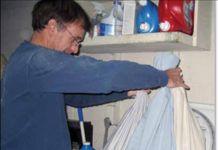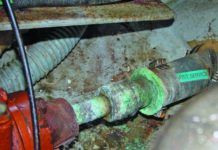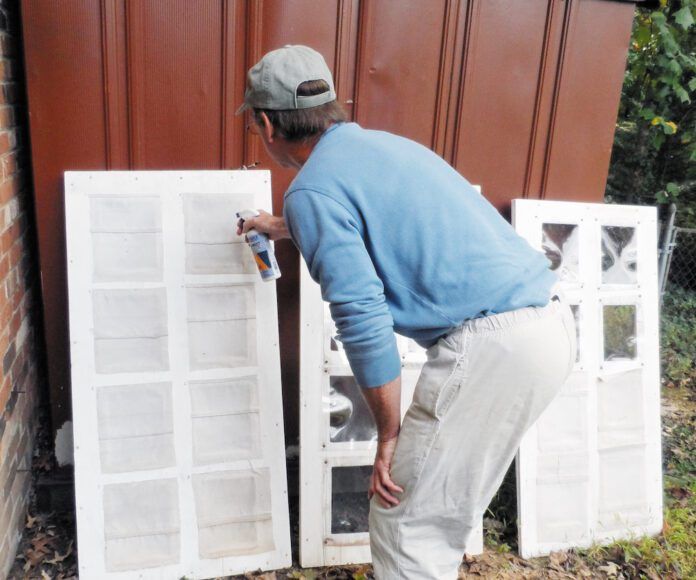Intent on carrying on with boat projects without impacting the supply chain for essential materials during the COVID-19 pandemic, I started poking around in the archives for projects that held to the spirit of “shelter-in-place.” I was cleaning out the garage anyway, so I expected to unearth a cache of possible ingredients for my own DIY “marine-grade” miracle potions.
I didn’t have to look far for guidance. In the May 2017 issue of Practical Sailor, we pulled back the curtain on the boat-cleaner con and showed you how you can make your own spray-bottle cleaners for far less than you pay for store-bought stuff. If you’ve got a locker full of nearly empty black-streak cleaners, waterline-stain cleaners, mildew preventers, bilge cleaners, and boat soaps, now is your chance to retire them all and reduce your cleaning arsenal to just four or five products that can fit in a small bucket.
This is not our first foray into the topic homemade maintenance supplies. A few years back we dug into the topic of homemade bronze polishes and found a couple of concoctions that proved their mettle-so to speak. Here’s an excerpt from that report, as well as a review of our favorite homemade mildew cleaner.
Lest you think multi-billion-dollar chemical companies and their geeks in white lab coats have a lock on cleaning your bronze, there are numerous home-brewed cleaning solutions that folks claim have the ability to put a shine on your bronze and a gleam in your eye.
We decided to test of a few of these strange brews. Below are three recipes and our test results. The first two were pulled from the Internet, and the third was sent in by reader Scott A. Morris of Clinton Lakes, Ill.
Home brew No. 1: Salt and vinegar paste
Recipe: Dissolve 3 teaspoons of salt into 1 cup of white vinegar. Add enough flour to make a paste, then scoopthe paste onto a clean sponge and polish. Rinse with hot water and buff dry with a soft cloth.
Result: This polish worked surprisingly well. While it took a little scrubbing, and we had to let the tougher stains soakfor 10 to 15 minutes, it worked well overall and earned arating of Good on our test scale.
Home brew No. 2: lemon paste
Recipe: Polish with a soft cloth soaked in a solution of lemonjuice and baking soda, or sprinkle baking soda on a slice oflemon and scrub. (We made a paste as in Brew No. 1.)
Result: After the mini-volcanic reaction of mixing lemon juice and baking soda settled down, the resulting paste powered off the stains exceptionally well with minimal scrubbing. We tried using a slice of lemon, but the cloth held up better and worked best while rubbing-it wasalso less messy. This home brew polish earned a solidrating of Very good on our test scale, comparable withmany of our top commercially produced performers.
Home brew No. 3, Morris’ Mix:
Recipe: Subscriber Scott A. Morris makes his polish by blending polishing compound (not rubbing compound)with a small amount of silicone car wax. According to Morris, a little experimentation will yield your best mix.
Result: Fair to Good overall, however, it took a bit of rubbing to clean our nasty bronze. We used a half-and-half mixture. Varying the mixture (say adding more polishing compound for tougher stains) might have produced even better results.
Overall, the results in the home brew category were pretty impressive, particularly considering that the first two have all natural ingredients and that all three are economical to make. While the Brews Nos. 1 and 2 cleaned the bronze, they lacked the luster of products such as the Miracle cloth. Following up the cleaning with a coat of wax (or even Morris’ Mix) would add shine and additional protection.
Of all the homebrew recipes we’ve tested, the one were most pleased with is our One-Penny mildew cleaner/preventer, which tester Drew Frye has tested extensively on his boat. We tried two formulas creatively named Formula A and Formula B, which cost just pennies to make. Our current favorite is Formula B, which we’ve used keep the interior of a damp and humid Catalina 22 mildew free in Florida for two years now. The anti-mildew formulas we tested each cost about one penny per ounce. Like the other mildew preventers in our test, you use these as cleaners by simply spraying the product on, wiping any excess away, and leaving it on. Before applying to any fabric, test the spray on an inconspicuous sample spot.
Formula A
1 quart hot water
1 tablespoon baking soda (sodium bicarbonate)
2 tablespoons washing soda (sodium carbonate)
2 tablespoons trisodium phosphate (TSP)
Much like Concrobium (which it is modeled after), our homemade Formula A removed the mildew from test carpet on board and kept it away, even though the area got wet again. It was also very effective in the moist-environment lab test.
Formula B
1 quart hot water
2 tablespoons baking soda
2 tablespoons Borax
1 tablespoon TSP
Formula B was the second-place performer overall in our test of mildew sprays. It was certainly the best value. It cleaned well, prevented mildew from returning to the carpet, and greatly slowed mildew infection in the moist-environment test in the lab. Weve used it for two years now on the damp interior of a boat stored in Florida. With a re-application every 90 days, the boats interior, which was once plagued with mildew, has remained mildew-free, while untreated samples stored on the same boat have been coated.
See the May 2017 issue of Practical Sailor for our full report “The One-Bucket Cleaning Kit,” covering a full range of homemade cleaners and protectants. And if you do have a bit more time on your hands, and are looking to restore your hull to like-new condition, our three-volume ebook Marine Cleaners: The Complete Series, will cover everything you need.






































Also pretty good is just vinegar, any kind, even with herbs, together with a bathroom-type scrub sponge. Don’t use the green ones that scratch. I found this quite good for the waterline in freshwater.
Stronger acids are used too but are quite dangerous. Oxalic acid is poisonous but does a good job on gelcoat rust spots.
Dear Darrell: Very Happy New Year 2022. I look forward to ship you some samples of my unique green cleaning products. Without exaggeration, are superior and addictive 😃Clean anything, eliminate rust, extend life of materials and most important no odors, no acids, no bacteria and no harm.I pioneer since 1995.
Welcome to ask any questions.
A dear friend Expert Sailor inspired me to understand how easy become to wash an entire boat and treat rust and bilges so successfully.
Best Regards.
Electra Cotsiopoulos (Instagram/Facebook
ELECTRA CHEM…Less Is More
786.285.7968
Very interesting, but it is unclear what you were cleaning with the Home Brews. I don’t have any bronze on my boat but lots of aluminum and stainless steel. I have not found anything that keeps stainless steel from tarnishing.
Also, on the Formula A and B is this intended for interior woodwork or just carpet. I don’t have any carpet but lots of wood. I normally use lemon oil on the woodwork which does a moderate job of keeping mildew at bay. Is this intended for the same purpose?